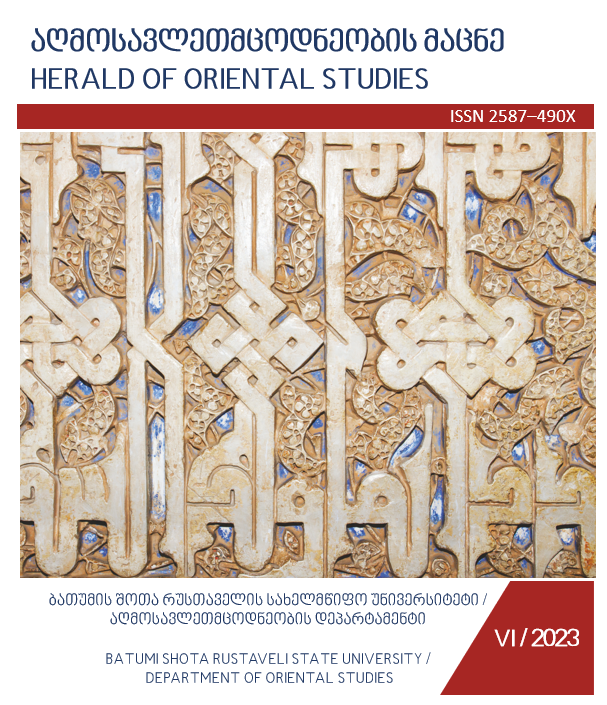სხვადასხვა დანიშნულების ჭურჭლის აღმნიშვნელი ლექსიკური ერთეულები „რუსუდანიანში“
LEXICAL UNITS DENOTING VESSELS FOR VARIOUS PURPOSES IN „RUSUDANIANI“
Author(s): Tamar GasitashviliSubject(s): Language and Literature Studies, Philology, Georgian literature
Published by: ბათუმის შოთა რუსთაველის სახელმწიფო უნივერსიტეტი, ჰუმანიტარული მეცნიერებატა ფაკულტეტის აღმოსავლეთმცოდნეობის დეპარტამენტის „ელექტრონული ჟურნალი“.
Keywords: Rusudaniani; linguistics; specialized vocabulary; vessels;
Summary/Abstract: One of the outstanding monuments of 17th-century Georgian writing is “Rusudaniani” (‘The story of Queen Rusudan’). The author’s name is unknown. From a linguistic perspective, this heroic-adventure epic is very interesting and offers rich material for studying the oriental language. Our research is also focused on this subject, particularly, the oriental terminology denoting vessels. Among the lexemes denoting utensils found in the full text of “Rusudaniani” are "mathara", "mujampari" // "mujapari" // "mujamari," "oka", "pisosi" and "pidani", which according to their function and purpose are special auxiliary utensils for different purposes. We united in a group.Among the lexemes denoting utensils found in the full text of the "Rusudaniani", we came across such lexemes as "matara", "mujampari" // "mujapari" // "mujamari", "oka", "pisosi" and "pidani", which we combined in a group of special auxiliary utensils for a variety of uses according to their function and purpose.From a linguistic point of view, the lexical units under consideration create an interesting picture. As a result of phonetic, morphological, semantic and, at the same time, historical and etymological analysis of these lexical units, it was found out that the words were introduced with certain phonetic and semantic changes that occur in different variants in the dialects of the Georgianlanguage:Matara is an Arab-Persian lexical unit. In Persian, it is a leather vessel for water, which is carried by travelers to perform ritual ablutions. This term was established in Georgian from Persian, since the Georgian form is closer to Persian. It is also found in “Rusudaniani” with the meaning of travel water vessel.Mujampari // Mujapari// Mujamari- lexeme is found in Georgian monuments with the same meaning as in the Arab-Persian ones. The word is also found in Persian with various phonetic variants. It is a vessel for flavoring of aromatic substances (alvar, musk, amber) used for the nobles during fests.In the "Rusudaniani" oka is a term for a vessel and is used to describe a house where medicinal liquids are kept. It seems that oka belongs to the storehouses of medicinal mixtures.In “Rusudaniani” pidani together with pisosi is mentioned in the list of various types of vessels. According to the context, pisosi and pidani are semantically lexemes of the same order and come close to "candle" in meaning. Both of these lexemes have been established in Georgian from the Persian language.
Journal: საერთაშორისო სამეცნიერო ჟურნალი „აღმოსავლეთმცოდნეობის მაცნე“
- Issue Year: 6/2023
- Issue No: 1
- Page Range: 200-222
- Page Count: 23
- Language: Georgian

